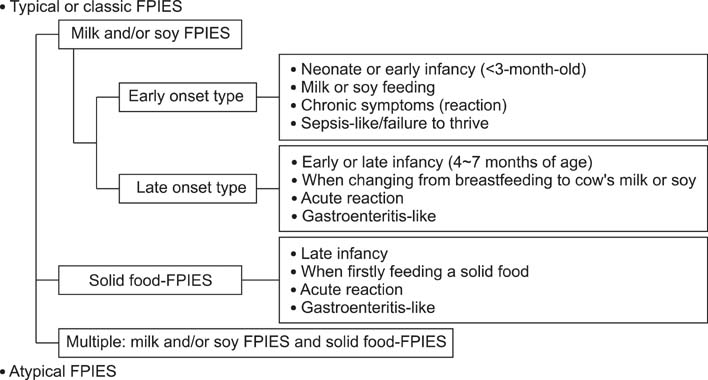Pediatr Gastroenterol Hepatol Nutr.
2014 Jun;17(2):74-79.
Is This Symptom Even a Food Allergy?: Clinical Types of Food Protein-induced Enterocolitis Syndrome
- Affiliations
-
- 1Department of Pediatrics, Keimyung University School of Medicine, Daegu, Korea. pedgi@kmu.ac.kr
Abstract
- Food protein-induced enterocolitis syndrome (FPIES) is an under-recognized non-IgE-mediated gastrointestinal food allergy. The diagnosis of FPIES is based on clinical history, sequential symptoms and the timing, after excluding other possible causes. It is definitively diagnosed by an oral food challenge test. Unfortunately, the diagnosis of FPIES is frequently delayed because of non-specific symptoms and insufficient definitive diagnostic biomarkers. FPIES is not well recognized by clinicians; the affected infants are often mismanaged as having viral gastroenteritis, food poisoning, sepsis, or a surgical disease. Familiarity with the clinical features of FPIES and awareness of the indexes of suspicion for FPIES are important to diagnose FPIES. Understanding the recently defined clinical terms and types of FPIES is mandatory to suspect and correctly diagnose FPIES. The aim of this review is to provide a case-driven presentation as a guide of how to recognize the clinical features of FPIES to improve diagnosis and management of patients with FPIES.
Keyword
MeSH Terms
Figure
Reference
-
1. Sampson HA, Anderson JA. Summary and recommendations: Classification of gastrointestinal manifestations due to immunologic reactions to foods in infants and young children. J Pediatr Gastroenterol Nutr. 2000; 30:Suppl. S87–S94.
Article2. Nowak-Wegrzyn A, Muraro A. Food protein-induced enterocolitis syndrome. Curr Opin Allergy Clin Immunol. 2009; 9:371–377.
Article3. Järvinen KM, Nowak-Węgrzyn A. Food protein-induced enterocolitis syndrome (FPIES): current management strategies and review of the literature. J Allergy Clin Immunol Pract. 2013; 1:317–322.
Article4. Leonard SA, Nowak-Wegrzyn A. Manifestations, diagnosis, and management of food protein-induced enterocolitis syndrome. Pediatr Ann. 2013; 42:135–140.
Article5. Sicherer SH. Food protein-induced enterocolitis syndrome: case presentations and management lessons. J Allergy Clin Immunol. 2005; 115:149–156.
Article6. Powell GK. Food protein-induced enterocolitis of infancy: differential diagnosis and management. Compr Ther. 1986; 12:28–37.7. Sicherer SH, Eigenmann PA, Sampson HA. Clinical features of food protein-induced enterocolitis syndrome. J Pediatr. 1998; 133:214–219.
Article8. Nowak-Wegrzyn A, Sampson HA, Wood RA, Sicherer SH. Food protein-induced enterocolitis syndrome caused by solid food proteins. Pediatrics. 2003; 111:829–835.
Article9. Mehr S, Kakakios A, Frith K, Kemp AS. Food protein-induced enterocolitis syndrome: 16-year experience. Pediatrics. 2009; 123:e459–e464.
Article10. Hwang JB, Sohn SM, Kim AS. Prospective follow-up oral food challenge in food protein-induced enterocolitis syndrome. Arch Dis Child. 2009; 94:425–428.
Article11. Katz Y, Goldberg MR, Rajuan N, Cohen A, Leshno M. The prevalence and natural course of food protein-induced enterocolitis syndrome to cow's milk: a large-scale, prospective population-based study. J Allergy Clin Immunol. 2011; 127:647–653.12. Sopo SM, Giorgio V, Dello Iacono I, Novembre E, Mori F, Onesimo R. A multicentre retrospective study of 66 Italian children with food protein-induced enterocolitis syndrome: different management for different phenotypes. Clin Exp Allergy. 2012; 42:1257–1265.
Article13. Ruffner MA, Ruymann K, Barni S, Cianferoni A, Brown-Whitehorn T, Spergel JM. Food protein-induced enterocolitis syndrome: insights from review of a large referral population. J Allergy Clin Immunol Pract. 2013; 1:343–349.
Article14. Firszt R, Sebastien K, Gleich GJ, Wagner LA. Delayed gastrointestinal symptoms after ingesting shrimp in the absence of IgE sensitization. J Allergy Clin Immunol. 2012; 129:AB170.
Article15. Fernandes BN, Boyle RJ, Gore C, Simpson A, Custovic A. Food protein-induced enterocolitis syndrome can occur in adults. J Allergy Clin Immunol. 2012; 130:1199–1200.
Article16. Hwang JB, Lee SH, Kang YN, Kim SP, Suh SI, Kam S. Indexes of suspicion of typical cow's milk protein-induced enterocolitis. J Korean Med Sci. 2007; 22:993–997.
Article17. Hwang JB, Song JY, Kang YN, Kim SP, Suh SI, Kam S, et al. The significance of gastric juice analysis for a positive challenge by a standard oral challenge test in typical cow's milk protein-induced enterocolitis. J Korean Med Sci. 2008; 23:251–255.
Article18. Hwang JB, Kang KJ, Kang YN, Kim AS. Probiotic gastrointestinal allergic reaction caused by Saccharomyces boulardii. Ann Allergy Asthma Immunol. 2009; 103:87–88.
Article19. Park MH, Shon SM, Choe BK, Kim YH, Kang YN, Choi WJ, et al. A case of isolated rice allergy. Korean J Pediatr Gastroenterol Nutr. 2006; 9:80–84.
Article20. Cavataio F, Carroccio A, Montalto G, Iacono G. Isolated rice intolerance: clinical and immunologic characteristics in four infants. J Pediatr. 1996; 128:558–560.
Article21. Shin JW, Hwang KW, Ahn YH, Hwang JB, Han CH, Chung HL, et al. Intractable diarrhea in early infancy: clinical features on admission and a nutritional management. J Korean Pediatr Soc. 1995; 38:936–945.
- Full Text Links
- Actions
-
Cited
- CITED
-
- Close
- Share
- Similar articles
-
- A Case of Milk Protein Induced Enterocolitis Syndrome
- Food Protein-induced Enterocolitis Mimic king Necrotizing Enterocolitis in a Premature Infant: Case Report
- Food allergy
- Clinical Features of Food Protein-Induced Enterocolitis Syndrome
- Food Protein-induced Enterocolitis Syndrome:an Update on Clinical Approaches and Its Pathophysiology


